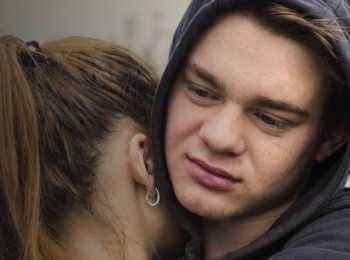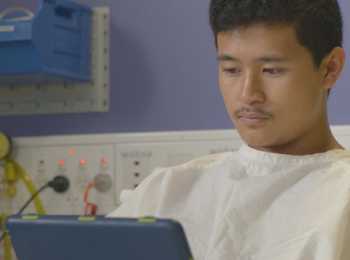Contents
Part 2
What is it like to have cancer?
What is it like to have cancer?
Cancer can mess with a person’s life big time. It can impact on their body, relationships, feelings and even their picture of what the future will look like.
Finding out that you have cancer can make the earth feel shaky, like everything suddenly becomes rocky and uncertain.
The whole situation might feel very unreal and at times completely overwhelming. Here are just some of the things your friend might be dealing with.
“I don’t think any of my friends really understood how much it affects a person’s life, and when they saw me look physically sick it really scared them.” Bailey
The physical stuff
Tests and treatments Cancer affects every person in a different way.
Depending on the type of cancer your friend has, they will need different tests and treatments. Many of these can be scary and not exactly pleasant.
Your friend might have to face a bunch of needles, inserted tubes, scans and X-rays as well as surgeries and medications.
They might not have the full story about what to expect or get much of a say about what will happen, which can make things even more frightening.
Side effects The unintended results of these treatments are called side effects and let’s be honest, they really can suck.
As well as hair loss, your friend may experience some of these changes:
• Weight loss or gain.
• Vomiting and nausea.
• Feeling tired and having no energy.
• Mouth sores and swallowing problems.
• Weakened immune system – that means a cold or other infection can make them very sick, so they might have to avoid crowds, pools and other places where infections can spread.
• ‘Chemo brain’ – getting forgetful and finding it hard to think clearly or remember things.
• Amputation – in some cases, when it is absolutely, totally 100% unavoidable, doctors might have to amputate a limb or other body part to stop the cancer spreading.
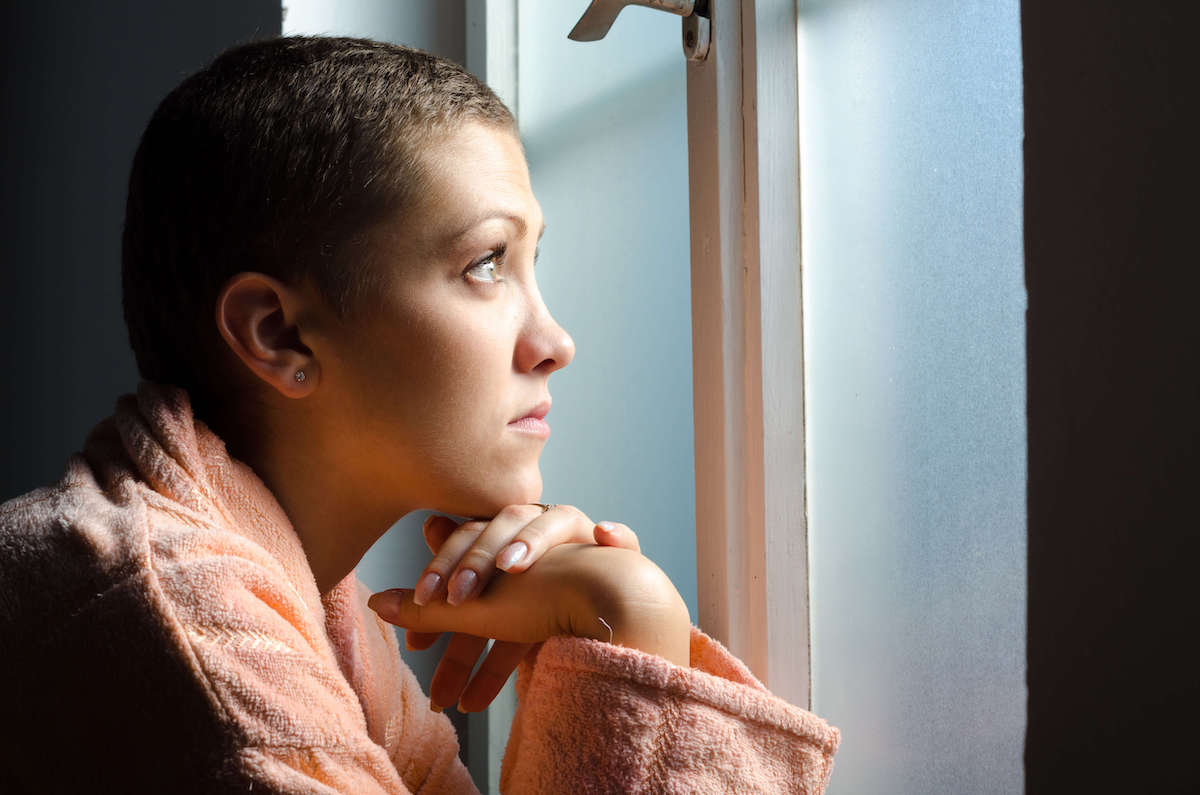
Life stuff
Cancer doesn’t only affect a person’s body, it can throw their whole world out of whack.
There will probably be heaps of changes going on in your friend’s life. Some will be huge. Some not that noticeable. And not all of them will necessarily be bad.
Here are some things that might be going on for your friend:
Missing out on doing normal young person things
Cancer might leave your friend feeling like an outsider from the world of young people. They just might not have the energy or time for parties, birthdays, sports practice, driving lessons or hanging out with friends and they might feel like they’re getting left behind.
Looking different
I’m too fat, too short, my hair’s too curly...most young people have issues with their body image at some point.
But someone with cancer might have some big things to add to the mix like scarring, weight gain, baldness and a body that won’t move the way it used to.
Your friend might be really upset or embarrassed about how they look during and after cancer. When your friend is ready, you could help them to work out exercise and healthy eating plans that will help them get their strength and confidence back.
In the meantime, maybe you can help them to think up some snappy comebacks for the people who stare and make silly comments.
Loss of independence and control
When a cancer diagnosis hits just at the time you are starting to build your own life and depend less on your folks, everything can shift off track.
Parents can get a bit overprotective when their child has cancer and want to do everything they can to make it easier.
They may not realise that your friend still needs some space and privacy and might want to make some decisions on their own.
Change in perspective
Your friend has probably had some pretty huge challenges thrown their way and some of them might have been really serious and difficult to deal with.
They may have changed their outlook on life.
Things that you think are really important may not matter so much to them any more.

Relationships
Everyone close to your friend will be affected by what’s happening and will be dealing with stuff in their own unique way.
Fights can become more common when families are stressed and they don’t all handle stress the same way.
Life with cancer can put pressure on even the most loving couples and add an extra challenge to dating new people.
Your friend might be finding what is – or isn’t – happening in their love life a huge source of worry.
School
Get this: your friend might actually miss going to school. Yes, school can be a hassle, but it makes up a massive part of your ‘normal’ life. But coming back after being away can be daunting.
There’s the worry that people might tease or stare and that keeping up with the work will be hard.
Teachers can usually help if they know what is going on.
Being treated differently
Lots of young people with cancer say that one of the hardest parts is suddenly feeling like the odd one out. Being smothered with attention or wrapped in cotton wool can be just as upsetting as having people keep their distance.
Your friend is the same person and they will probably like to feel as normal as possible.
“The hardest thing when I went back to school was friends freaking out at my change of look. The most helpful thing was hearing people say that they don’t see me any differently.” Kym
Emotional stuff
Every young person who has cancer will feel differently about what is happening, but it’s likely that most will go through some major ups and downs.
Your friend might be swinging from one emotion to another or feeling a confusing mix of things at once – it is actually possible to be happy AND miserable at the same time!
Some days your friend’s feelings might be so intense and out of control that they feel completely overwhelmed.
Your friend might feel embarrassed about some of the things they feel and worry that their reaction is not normal, especially if they don’t know anyone else who has been through a similar thing.
All feelings are normal and understandable. There is no ‘right’ or ‘wrong’ way to feel. However your friend feels is right for them.
Try to be patient around your friend and forgive them if they get snappy and cranky at times.
If they try to hide their feelings because they are worried about what other people may think, their feelings can build up and become even harder to handle.
At different times, and for different reasons, your friend might feel:
• relieved
• confused
• shocked
• guilty
• scared
• jealous
• sad
• numb
• uncertain
• worried
• over it
• frustrated
• lonely
• angry
• annoyed
• left out
• embarrassed
• hopeful
• nothing at all

“I wish my friends understood that I am going to be vulnerable and moody and upset, so please just accept me for how I am and love me no matter how I react or act.” Sarah
How can I help?
It can be super hard to understand what your friend is going through and to know what help they might need.
You may not even be sure whether they want help or special treatment or if you should just try to keep things as normal as possible.
Everyone is different and not everyone will want the same thing. Tell your friend that you want to help and ask them what they need. It can be a comfort just to know you care.
You don’t have to take on a lot of responsibility for looking after your friend. And you don’t have to be able to make everything better. No one can do that.
But it can mean a lot to someone who has cancer just to have some company – people who are willing to be there with them whether they want to scream, cry, talk, or just laugh.
Here are some suggestions of things that might help:
Stay in touch
Check in regularly, even if they don’t always return your calls or messages.
Call just to say, “Hi”, forward them funny links, send random texts.
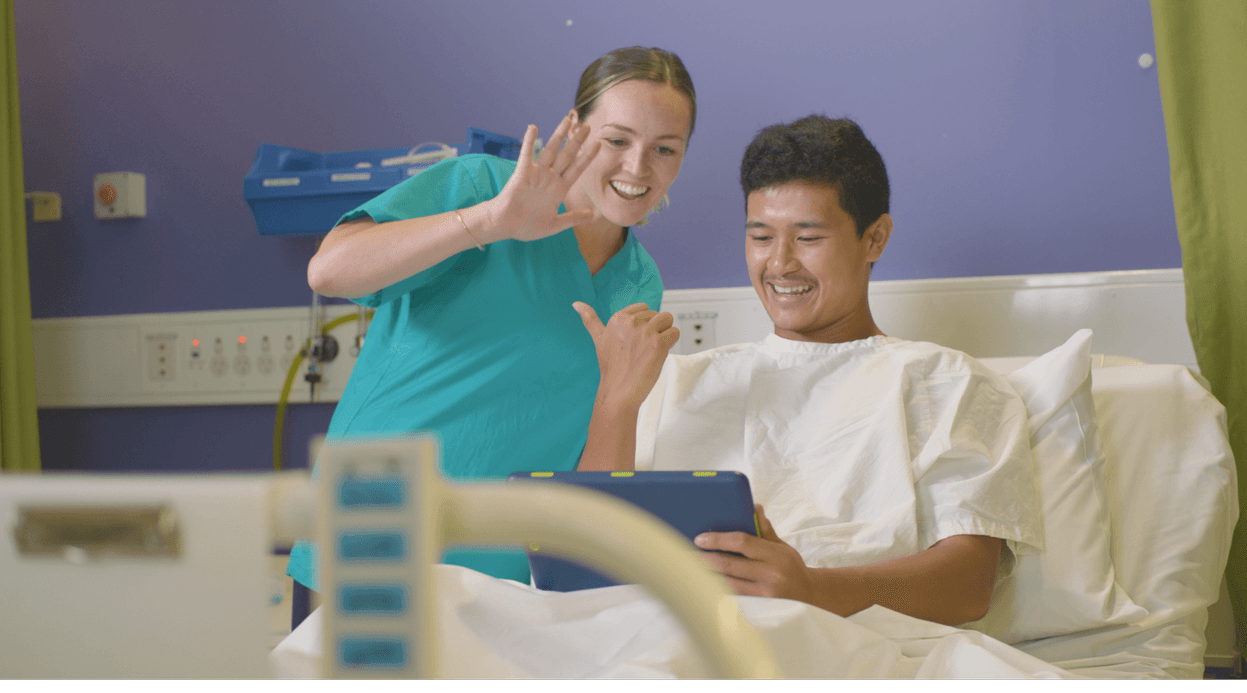
Keep inviting them places even if they tend to turn you down
Keep them in the loop and make it obvious you haven’t forgotten about them.
“My school friends bought a bear for me and wrote well-wishes all over it...it was the single nicest thing I have ever experienced.” Max
Visit them
It can be really lonely and boring to be stuck at home or in hospital and missing out on things.
Try to think of things to do together that aren’t too tiring – like watching TV, playing video games, looking at photos, or reading magazines. But remember, they might not always be up for visitors.
Check in first and just give it a go another time if they turn you down.
Offer to help in specific ways
Don’t wait for your friend to ask for help - they probably won’t.
Suggest practical things you could do like, “I’ll bring you a coffee” or “Want me to come over on the weekend and hang out?”
Give them something nice to let them know you’re thinking of them
A letter or card, flowers or a plant, chocolate, their favourite food, a book or magazine...
Talk to someone
If you’re not sure about what you should be doing or worried that your friend is struggling with their feelings, talk to someone who can help – like a teacher, doctor, nurse, chaplain, or counsellor.
Call a helpline
If you need to speak to someone right now, about anything at all, call Kids Helpline on 1800 55 1800 or LifeLine on 13 11 14.
Tips for talking
If you’re like most people, you’re not that great at knowing exactly the right thing to say at the right time. And it can be extra hard to talk to someone who has, or has had, cancer.
You might worry:
“I don’t know if I should bring up cancer…or talk about anything and everything EXCEPT cancer?”
“What if I say the wrong thing and upset them?”
“I don’t want to call in case I’m interrupting something or they’re feeling too sick.”
“We’re not really that close. They might think I’m just being nosy…”
“I want to tell them about this thing that happened but my life seems so boring and unimportant compared to theirs now.”
Everyone is new at this and these kinds of thoughts are common. But the trick is to not let your fear of saying the wrong thing stop you from saying anything at all.
Why talking can help
It can be scary as anything to talk to friends about your personal thoughts and feelings. But most young people who have cancer find that it really does help to talk if you can.
“One of my friends used to come to my house and just talk about all that was happening at school and just normal things...it reminded me that I was still a teenager, not just a patient.” Bailey

Here are some other things to think about:
• You don’t always need to know what to say. Your friend might just find it a relief to vent.
• Not talking about difficult stuff doesn’t make it go away. Little worries can grow into big fears when they tumble around in your head.
• Putting thoughts and feelings into words can make them easier to understand and seem easier to handle. Other people can help you see things from a different perspective.
• Your friend might feel lonely or ignored if they can’t talk about what is happening.
• Talking to your friend can help you feel closer to each other and give you some ideas about the kind of help they might need.
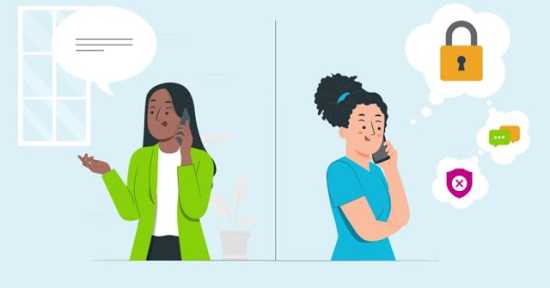
Video
6 tips to make you a better listener
Active listening is an important skill to have when you’re supporting a friend that has cancer. Watch this video for 6 tips on how to make your communication more effective.















